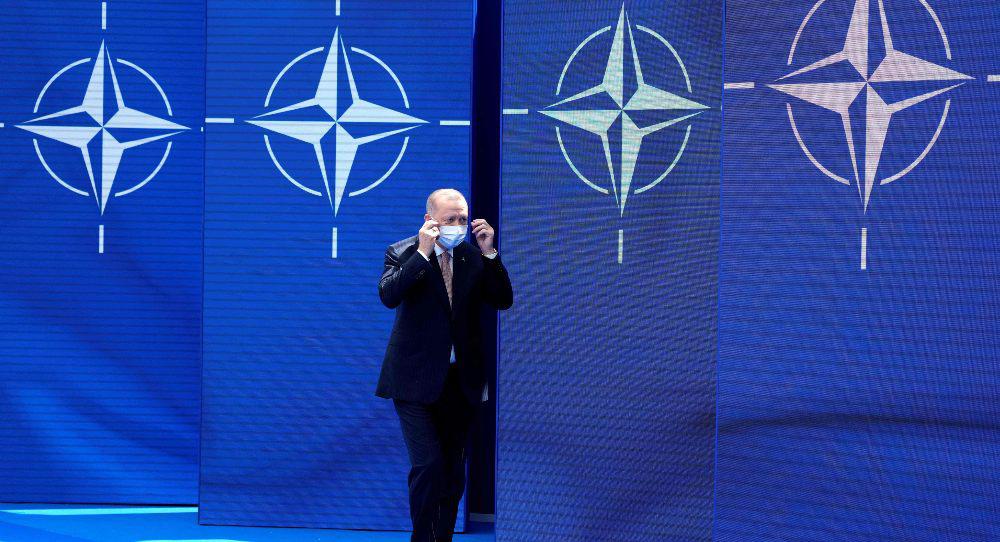Now that Sweden and Finland have officially applied for membership in the North Atlantic Treaty Organization (NATO), it may be time to pay homage to a story about the Atlantic alliance that appeared in Henry Kissinger’s memoirs, White House Years. In 1965, he wrote a book about the organization, The Troubled Partnership: A Reappraisal of the Atlantic Alliance. Very few people knew of Kissinger then, and fewer still bought his book. But the tome did well in one bookstore, where it had been placed in the marriage counseling section—by mistake.
We don’t know if Kissinger’s book helped American couples with their marital woes, but we do know that NATO weathered its troubles of the 1960s and has since grown to its present size of 30 members. Sweden and Finland, who did not join NATO at its inception, now want to be a part of it. President Biden welcomed their decision and honored their respective leaders at the White House. In the ensuing press conference, he was full of praise for his guests and gushed out: “We reject the bloody creed that ‘might makes right,’ and “we value freedom, democracy, and human dignity above all else.”
While America’s history casts large shadows over these pronouncements, the statement of Magdalena Andersson, the prime minister of Sweden, was much more timely and to the point. She said, “We are champions of freedom, democracy and human rights,” and all the refugees of the world would have agreed with her. And yet one head of state, President Recep Tayyip Erdogan of Turkey, a member of NATO, has accused both Finland and Sweden as “guesthouses” and “hotbeds” of terrorists. In fact, he has since vowed to block their entrance into the alliance.
Let us compare the Nordic countries with Turkey. Many Swedes and Finns have migrated to other lands, but very few have chosen Turkey as their final destination—the most noteworthy is the story of King Charles XII who sought temporary refuge in Ottoman controlled lands 300 years ago. Today, thousands of Turks and many more Kurds are making Sweden and Finland their adopted homelands. Mehmed Uzun, the famed Kurdish novelist, credits Sweden as his shelter and muse for his extraordinary success.
Yet Turkey, a country that has been at war with the Kurds for the past 38 years, now wants to decide if Sweden and Finland should get a pass for the NATO membership. That is akin to asking President Putin whether Ukrainians are qualified to practice their right of self-determination. President Erdogan, like President Putin, doesn’t believe in the right of self-determination. The Kurds he doesn’t like include, Amineh Kakabaveh, a member of Swedish parliament. He has asked for her extradition to Turkey.
Silencing critics is a mark of authoritarian leaders and both President Putin and President Erdogan are in a league of their own when it comes to their critics. The first uses his army to topple President Volodymyr Zelensky of Ukraine; the second takes the farce to a higher level and wants the countries that want to join NATO to do his dirty work. The running joke in the Kurdish coffee shops is that President Erdogan never really wanted to join the European Union; he was always trying to make the European Union look like Turkey!
Joke aside, NATO came into existence to withstand communism. Will it have the same luck now with authoritarianism?
In fighting communism, America welcomed Turkey’s contribution to contain the Soviet Union in spite of the latter’s manifest authoritarian credentials. Last year, it snubbed Ankara when it hosted the Summit of Democracy in Washington, DC. Kurds are Turkey’s ticket to relative freedom, as they be may be its relative pink slip out of the Atlantic alliance. Turks need political help—not military aid, with how to live with Kurds. Using NATO weapons to subdue them is like applying monkey wrenches to fix computers. Canadians don’t bomb Quebec to cultivate security in their country; they practice what Will Durant calls “mutual tolerance” to live in peace.
American couples with marital problems, longing for domestic peace, made Kissinger’s book about NATO a relative bestseller in at least one bookstore. American leaders who care about the fate of democracy—and President Biden says he does, relative to authoritarianism, taking advantage of this crisis, can make their country a favored one in Turkey—provided they require strict compliance with the founding principles of NATO for all its members. Peace like that of Canada in Turkey will be the reward of such policy. Imagine the day when no one digs a grave for a Kurdish guerrilla or Turkish soldier.
Written exclusively by Kani Xulam for NAT – News about Turkey
Kani Xulam runs the American Kurdish Information Network (AKIN).
Follow him on Twitter: @AKINinfo
News about Turkey offers readers different points of view. The opinion expressed in this text is not necessarily shared by NAT.



